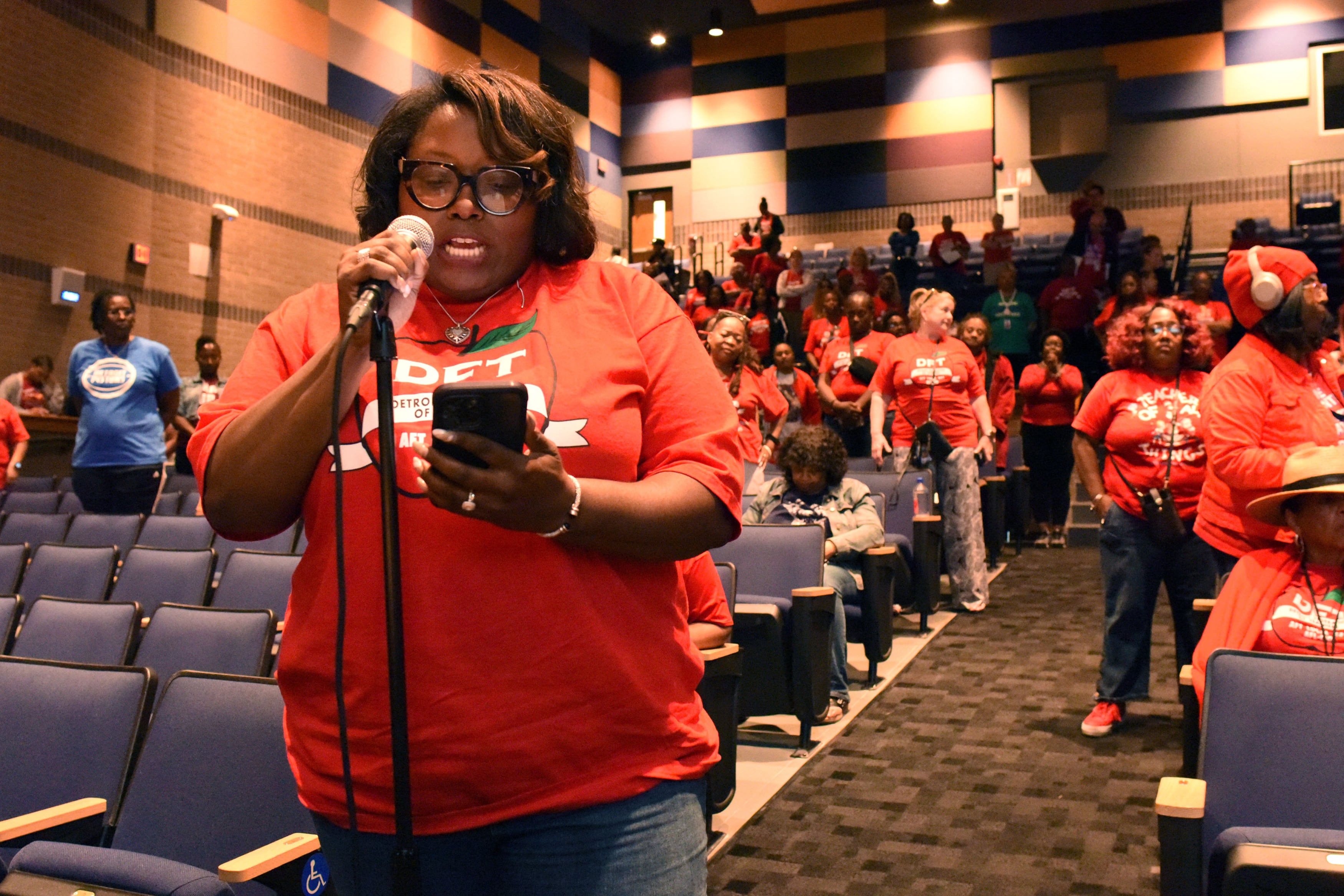The Detroit school board on Tuesday delayed voting on proposed changes to its policy on public participation at school board meetings to give the public more time to learn about the potential changes.
The board will now weigh in at its Dec. 10 meeting.
The Detroit Public Schools Community District board policy would eliminate people’s ability to make public comments when they’re attending board meetings virtually, as well as require those who want to speak in person to provide more information than is currently necessary and would allot more speaking time to speakers who need a translator or have a disability.
The proposed changes came before the board for a first reading at October’s regular school board meeting.
Misha Stallworth West, who chairs the board’s policy committee, previously told Chalkbeat that in addition to ensuring that current practices are put in writing, the proposed policy “helps to ensure there’s not confusion between the board and the public around what’s happening and how it happens.”
However, Stallworth West suggested Tuesday that the board table the proposal until December’s meeting to give the community more time to learn about the policy.
“We’ll be looking for support from staff on community education efforts and platforms related to this,” she said.
Concerns about the policy were brought up during the public comment period from former school board candidate Aliya Moore. She called the proposal “embarrassing” and accused the board of being fearful of the public.
“How can we be at a second read to try to block, restrict, restrain, refrain the public that got you all in these positions, and we didn’t have a policy meeting in September or October,” Moore said. The policy committee actually met Oct. 1.
“Weren’t we supposed to have at least one meeting discussing this in a committee meeting before it goes to a second read? Let’s be for real, board.”
Fellow school board candidates Nicole Conaway and Tabrian Joe also spoke, saying the proposed policy is part of the district’s issues with maintaining a positive climate and culture and that Detroiters’ voices deserve to be heard.
“We have leadership that does not respect the people of the community, and they rush through these meetings and have closed sessions to try to push people away,” Conaway said. “That’s the problem with the climate and culture, and money is not going to fix that. We need new leadership for that.”
Meanwhile, Joe said the board needs to be accountable to the community and that it should be tabled until the new school board members, Monique Bryant and Ida Simmons Short, start their terms.
“The board is accountable to the people that come here every day, speak out, and advocate for the students of Detroit,” Joe said. “Detroit deserves a board that is accountable to the people, and the only way people can hold them accountable is through public comment.”
Board approves contracts for multiple union groups
The board also approved contracts with paraprofessionals, food service workers, and noon-hour aides at Tuesday’s meeting.
The two-year contracts were approved for members of the Detroit Federation of Paraprofessionals, the Detroit Association of Educational Office Employees, and the Organization of School Administrators and Supervisors.
Here’s a closer look at what employees will earn through 2025:
- Members of the paraprofessionals union, which also includes school culture facilitators, school culture facilitators, food service workers, and noon-hour aides, will receive a 4% pay increase for the current school year retroactive to July and a 3% pay increase for the 2025-26 school year.
- Members of the office workers union will also receive a 4% pay increase retroactive to July. Their pay increase for the 2025-26 school year will be 3%.
- Members of the administrators and supervisors union will receive a current year 4% pay increase retroactive to July and a 3.5% increase for 2025-26.
- A December retention bonus is also part of the contract for the DFP and the DAEOE. Staff members who were employed by the district by Feb. 1 and remained actively employed through Nov. 1 will receive a $2,000 bonus. They will receive another $2,000 bonus next year if they are employed from Feb. 1, 2025 to Nov. 1, 2025.
- OSAS members will receive a $1,000 “enhancement” of their base salary if they’re employed from Feb. 1 to Nov. 1 this year and another $1,000 for the same time period in 2025.
- Members of each union will receive longevity bonuses that range from $1,000 to $2,000.
Micah Walker is a reporter for BridgeDetroit. You can reach her at mwalker@bridgedetroit.com.







